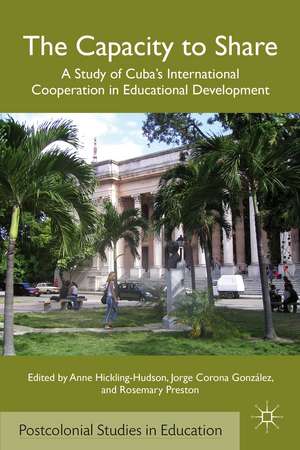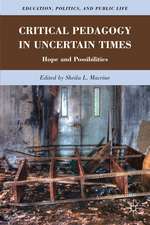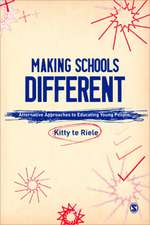The Capacity to Share: A Study of Cuba’s International Cooperation in Educational Development: Postcolonial Studies in Education
Editat de A. Hickling-Hudson, J. González, R. Prestonen Limba Engleză Hardback – 16 aug 2012
| Toate formatele și edițiile | Preț | Express |
|---|---|---|
| Paperback (1) | 305.26 lei 3-5 săpt. | |
| Palgrave Macmillan US – 16 aug 2012 | 305.26 lei 3-5 săpt. | |
| Hardback (1) | 543.15 lei 3-5 săpt. | |
| Palgrave Macmillan US – 16 aug 2012 | 543.15 lei 3-5 săpt. |
Din seria Postcolonial Studies in Education
-
 Preț: 306.57 lei
Preț: 306.57 lei -
 Preț: 305.70 lei
Preț: 305.70 lei -
 Preț: 299.96 lei
Preț: 299.96 lei -
 Preț: 324.21 lei
Preț: 324.21 lei - 9%
 Preț: 756.91 lei
Preț: 756.91 lei -
 Preț: 305.50 lei
Preț: 305.50 lei -
 Preț: 304.38 lei
Preț: 304.38 lei - 8%
 Preț: 582.60 lei
Preț: 582.60 lei -
 Preț: 305.50 lei
Preț: 305.50 lei -
 Preț: 301.10 lei
Preț: 301.10 lei -
 Preț: 307.68 lei
Preț: 307.68 lei -
 Preț: 387.75 lei
Preț: 387.75 lei - 18%
 Preț: 725.61 lei
Preț: 725.61 lei -
 Preț: 397.38 lei
Preț: 397.38 lei -
 Preț: 386.81 lei
Preț: 386.81 lei - 18%
 Preț: 888.31 lei
Preț: 888.31 lei - 18%
 Preț: 894.03 lei
Preț: 894.03 lei
Preț: 543.15 lei
Preț vechi: 590.38 lei
-8% Nou
Puncte Express: 815
Preț estimativ în valută:
103.93€ • 108.51$ • 86.02£
103.93€ • 108.51$ • 86.02£
Carte disponibilă
Livrare economică 14-28 martie
Preluare comenzi: 021 569.72.76
Specificații
ISBN-13: 9780230338807
ISBN-10: 0230338801
Pagini: 294
Ilustrații: XXII, 294 p. 1 illus.
Dimensiuni: 152 x 229 x 23 mm
Greutate: 0.59 kg
Ediția:2012
Editura: Palgrave Macmillan US
Colecția Palgrave Macmillan
Seria Postcolonial Studies in Education
Locul publicării:New York, United States
ISBN-10: 0230338801
Pagini: 294
Ilustrații: XXII, 294 p. 1 illus.
Dimensiuni: 152 x 229 x 23 mm
Greutate: 0.59 kg
Ediția:2012
Editura: Palgrave Macmillan US
Colecția Palgrave Macmillan
Seria Postcolonial Studies in Education
Locul publicării:New York, United States
Cuprins
Introduction: Cuba's Capacity to Share; Anne Hickling-Hudson, Jorge Corona González, and Rosemary Preston SECTION 1: CUBANS SHARING EDUCATION AND HEALTH SERVICES: THE REVOLUTIONARY AND MATERIAL BASIS 1. The Cuban Revolution and Internationalism: Structuring Education and Health; Anne Hickling-Hudson, Jorge Corona González, and Sabine Lehr, with Marina Majoli Viani 2. Challenging Educational Underdevelopment: The Cuban Solidarity Approach as a Mode of South-South Cooperation; Jorge Corona González, Anne Hickling-Hudson, and Sabine Lehr 3. Cuba's Education System: A Foundation for "The Capacity to share"; Elvira Martín Sabina, Jorge Corona González, and Anne Hickling-Hudson SECTION 2: STUDYING IN CUBA; RETURNING HOME TO WORK 4. Cuban Higher Education Scholarships for International Students: An Overview; Francisco Martínez Pérez 5. The Children of the Isle of Youth: How Ghanaian Students Learned to Cope with "Anything in Life"; Sabine Lehr 6. Studying in Cuba, Returning Home to Work: Experiences of Graduates from the English-Speaking Caribbean; Anne Hickling-Hudson 7. Cuban Support for Namibian Education and Training; Rosemary Preston SECTION 3: CUBAN EDUCATORS; SHARING SKILLS INTERNATIONALLY 8. Cuba's Educational Mission in Africa: The Example of Angola; Christine Hatzky 9. Capacity Building in Latin American Universities: Cuba's Contribution; Boris Tristá Pérez 10. "You Help Me Improve My English, I'll Teach You Physics!" Cuban Teachers Overseas; Anne Hickling-Hudson 11. Cuba's Contribution to Adult Literacy, Popular Education, and Peace Building in Timor-Leste; Bob Boughton SECTION 4: THE GLOBAL REACH OF CUBAN EDUCATION: PARTICIPANT NARRATIVES 12. Cubans Sharing Education: The Isle of Youth; Oscar Elejalde Villalón interviewed by Anne Hickling-Hudson and Jorge Corona González 13. The Long Road to Neurosurgery: Reflections from Ghana on 18 Years of Studies in Cuba; Samuel Kaba Akoriyea, with Sabine Lehr 14. The International Film and Television School inCuba: For a Stronger Media Culture in the Global South; Anne Hickling-Hudson and Melanie Springer 15. Air Raids, Bride Price, and Cuban Internationalism in Africa: A Cuban Teacher in the Angolan Civil War; Marta Fernández Cabrera interviewed by Anne Hickling-Hudson 16. Teaching in Rural Jamaica: Experiences of a Cuban Teacher; Emelina P. Pérez Herrera interviewed by Anne Hickling-Hudson 17. Cuban Cooperation in Literary and Adult Education Programs Overseas; Jaime Canfux Gutiérrez interviewed by Jorge Corona González and Anne Hickling-Hudson 18. The Role of the APC (Association of Cuban Educators) in Advancing Cuban Internationalism in Education; Lidia Turner Martí interviewed by Anne Hickling-Hudson and Alejandro Torres Saavedra SECTION 5: ENDNOTE 19. Achievements, Celebrations, and Learning; Rosemary Preston
Recenzii
'This book is a powerful testimony to Cuba's educational solidarity, which did not end in Mozambique, Angola, Namibia, or later in Nicaragua, but continues as a unique approach to international cooperation between developing countries. It was offered, at a time of very great need in our country, using methods that were new to us. They produced lasting results of a very high standard, raising the quality of our human resources to levels unattainable without this support. Not a rich country, Cuba gave its knowledge and the strength of its revolutionary practical learning to tens of thousands of young people, sharing its very heart and soul with us.' - Graça Machel, Minister of Education and Culture in Mozambique 1975-1989; Founding Member of The Elders
'This is a pioneering, authoritative volume on Cuba's internationalism in education. It provides a comprehensive conceptual framework of the profound impact of Cuban educational and cultural exchanges and sharing with partner countries around the globe. The case studies and firsthand accounts of those who came to Cuba to learn, and of Cubans who went abroad to share skills and expand knowledge, illuminate a postcolonial alternative model of South-South cooperation. Kudos to authors/editors Hickling-Hudson, Corona Gonzalez, and Preston for this invaluable contribution to scholarship and to our understanding of more enlightened international aid policies and practices.' - Robert F. Arnove, Chancellor's ProfessorEmeritus of Educational Leadership and Policy Studies, Indiana University, Bloomington
'The Capacity to Share is a deeply important contribution to the international aid and development discussion. It documents the extraordinary story of Cuba's role in global development, assisting over 120 other low-income countries by providing them during the past 50 years with many thousands of Cuban scholarships, medical personnel, teachers and engineers. Cuba has done this on the basis of the simple principle of solidarity an international sense of brotherhood and sisterhood. This demonstrates to the world a way of being that does not need to be activated by 'winning', by patronizing charity, by being 'on top'. All that counts is our common humanity. We must all be grateful to Anne Hickling-Hudson, Jorge Corona Gonzalez, and Rosemary Preston for authoring, encouraging, and editing this book.' - Crain Soudien, Deputy Vice Chancellor, University of Cape Town; Past President of the World Council of Comparative and International Education Societies (WCCES)
'The Capacity to Share is an exceptional resource for scholars. It brings to life Cuban educational policy and the little-studied principles and practices of internationalism that have made Cuba's commitment to 'sharing' integral to the revolutionary educational project. This matchless collection offers a postcolonial frame for engaging pressing issues of educational development in the 21st century world. The analytical essays, case studies, narratives, and testimonials explore with rich detail the achievements of the Cuban system that have created the capacity to share personnel and expertise with other countries in the global south. Within complex political realities, Cuba's promotion of solidarity and South-South cooperation becomes a compelling alternative. With ample evidence and the critical insights of scholars from inside and outside Cuba, The Capacity to Share contributes uniquely to our understanding of the histories and the heuristics of Cuba's educational internationalism.' - Sheryl Lutjens, Chair of Women's Studies at California State University, San Marcos
'This is a pioneering, authoritative volume on Cuba's internationalism in education. It provides a comprehensive conceptual framework of the profound impact of Cuban educational and cultural exchanges and sharing with partner countries around the globe. The case studies and firsthand accounts of those who came to Cuba to learn, and of Cubans who went abroad to share skills and expand knowledge, illuminate a postcolonial alternative model of South-South cooperation. Kudos to authors/editors Hickling-Hudson, Corona Gonzalez, and Preston for this invaluable contribution to scholarship and to our understanding of more enlightened international aid policies and practices.' - Robert F. Arnove, Chancellor's ProfessorEmeritus of Educational Leadership and Policy Studies, Indiana University, Bloomington
'The Capacity to Share is a deeply important contribution to the international aid and development discussion. It documents the extraordinary story of Cuba's role in global development, assisting over 120 other low-income countries by providing them during the past 50 years with many thousands of Cuban scholarships, medical personnel, teachers and engineers. Cuba has done this on the basis of the simple principle of solidarity an international sense of brotherhood and sisterhood. This demonstrates to the world a way of being that does not need to be activated by 'winning', by patronizing charity, by being 'on top'. All that counts is our common humanity. We must all be grateful to Anne Hickling-Hudson, Jorge Corona Gonzalez, and Rosemary Preston for authoring, encouraging, and editing this book.' - Crain Soudien, Deputy Vice Chancellor, University of Cape Town; Past President of the World Council of Comparative and International Education Societies (WCCES)
'The Capacity to Share is an exceptional resource for scholars. It brings to life Cuban educational policy and the little-studied principles and practices of internationalism that have made Cuba's commitment to 'sharing' integral to the revolutionary educational project. This matchless collection offers a postcolonial frame for engaging pressing issues of educational development in the 21st century world. The analytical essays, case studies, narratives, and testimonials explore with rich detail the achievements of the Cuban system that have created the capacity to share personnel and expertise with other countries in the global south. Within complex political realities, Cuba's promotion of solidarity and South-South cooperation becomes a compelling alternative. With ample evidence and the critical insights of scholars from inside and outside Cuba, The Capacity to Share contributes uniquely to our understanding of the histories and the heuristics of Cuba's educational internationalism.' - Sheryl Lutjens, Chair of Women's Studies at California State University, San Marcos
Notă biografică
ROSEMARY PRESTONDirector of the International Centre for Continuing Education (INCED) at the University of Warwick, UK.
ANNE HICKLING-HUDSONAssociate professor of International and Cross-cultural education in Australia at the Queensland University of Technology's School of Cultural and Language Studies, Faculty of Education.
JORGE CORONA GONZALEZ teaches Political Economy at the University of Havana, Cuba. A former president of the Pedagogical Institute for Latin America and the Caribbean, he is currently special advisor on International Collaboration in Cuba's Ministry of Education, and a member of the UNESCO Chair in Educational Sciences.
ANNE HICKLING-HUDSONAssociate professor of International and Cross-cultural education in Australia at the Queensland University of Technology's School of Cultural and Language Studies, Faculty of Education.
JORGE CORONA GONZALEZ teaches Political Economy at the University of Havana, Cuba. A former president of the Pedagogical Institute for Latin America and the Caribbean, he is currently special advisor on International Collaboration in Cuba's Ministry of Education, and a member of the UNESCO Chair in Educational Sciences.











